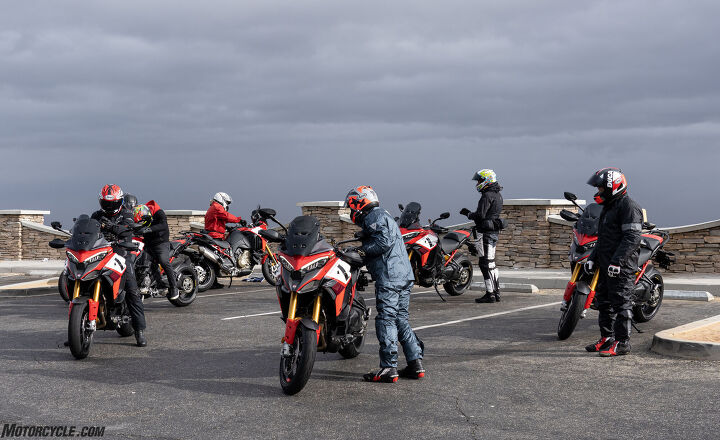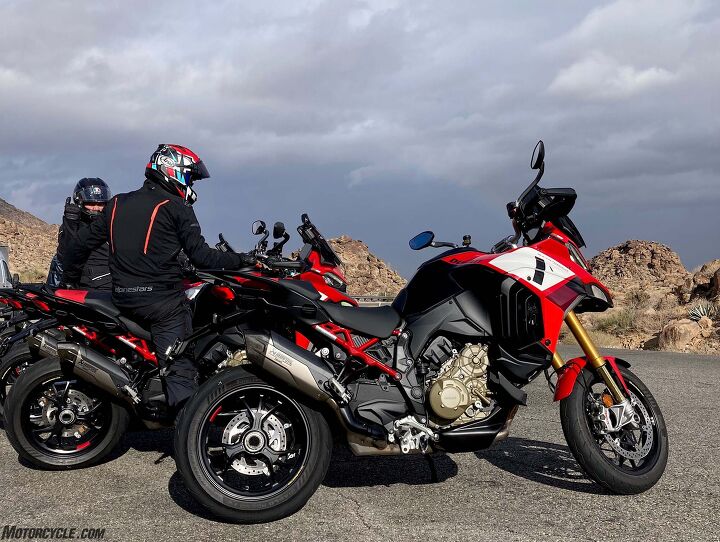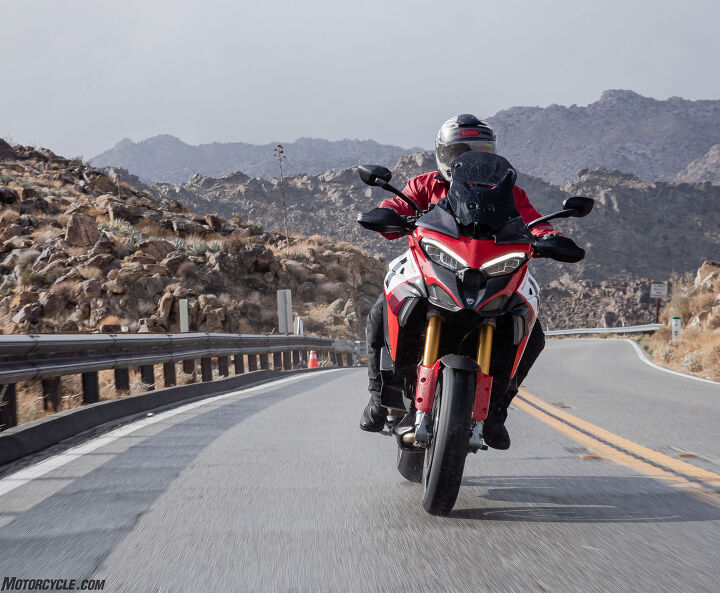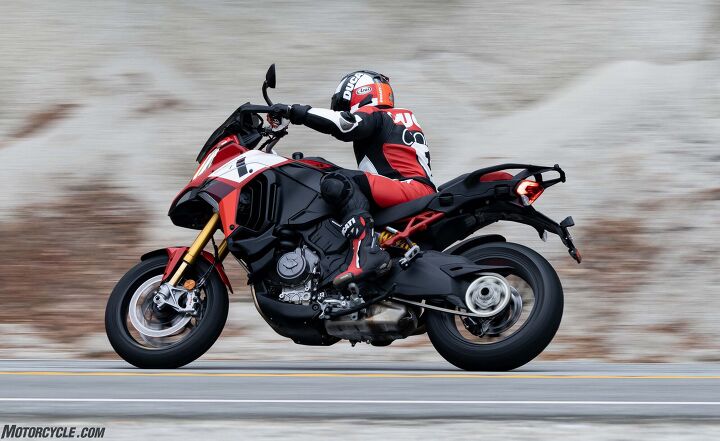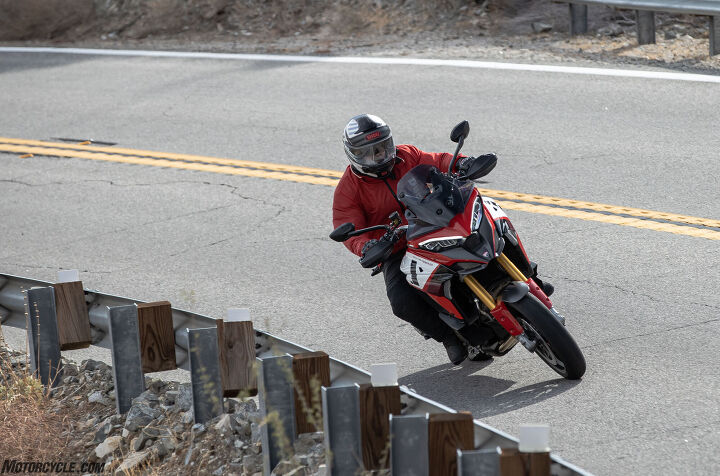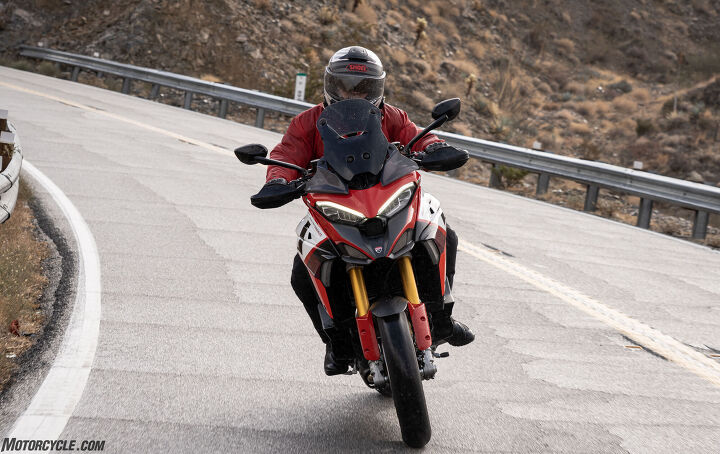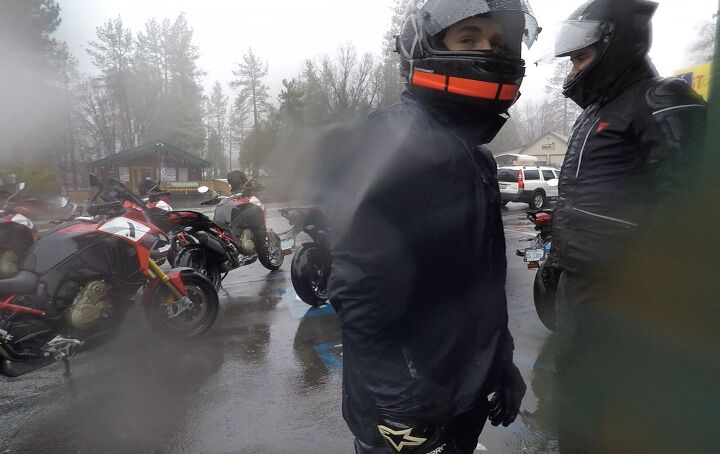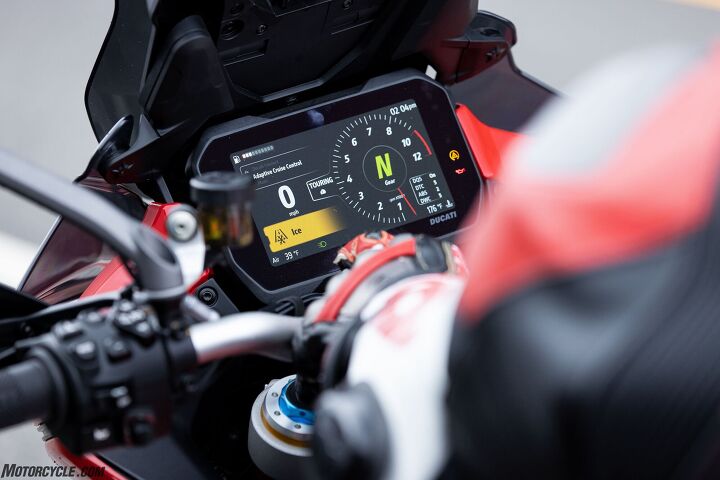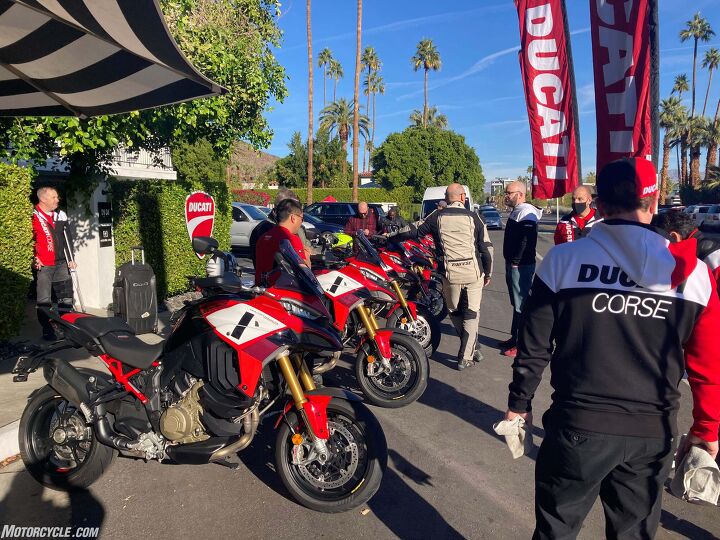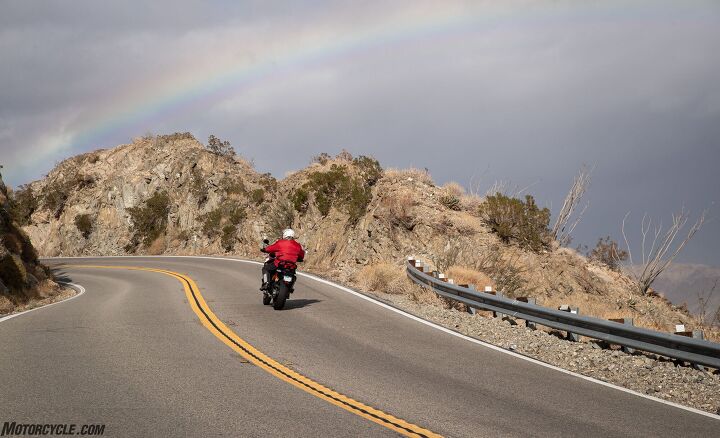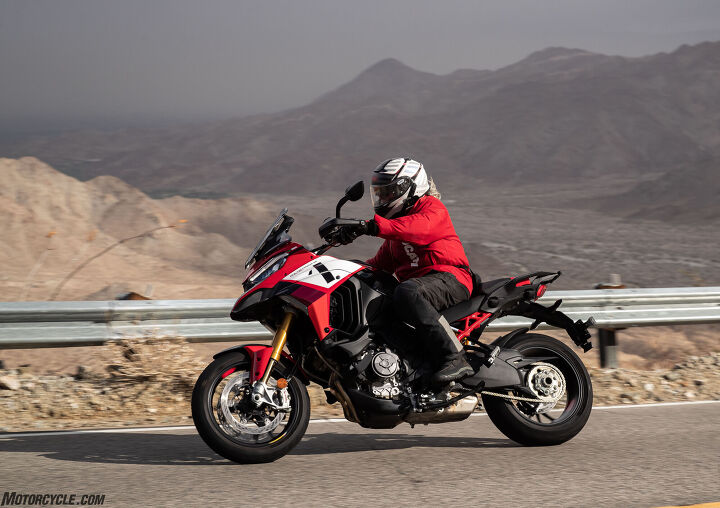Motorsports Racing News & Blog Articles
2022 Ducati Multistrada V4 Pikes Peak Review First Ride
As I observed to my Ducati host just before we started up the mountain toward Idyllwild (elevation 5,800 feet) from Palm Desert, California (220 ft) – this is either going to be one of the greatest rides ever or one of the worst. Pity the poor new model launch planner: If it rains hard more than a few days a year around Palm Springs I’d be surprised. But logistics have to be laid out weeks ahead of time, and as the day for our ride drew nearer, the weather forecast for last Tuesday had evolved from 20% to 40% to 100% rain, to “atmospheric river.”
2022 Ducati Multistrada V4 Pikes PeakEditor Score: 93.25%
| Engine | 19/20 | Suspension | 14.5/15 | Transmission | 9.25/10 |
| Brakes | 9.75/10 | Instruments | 4.75/5 | Ergonomics | 9/10 |
| Appearance | 9.5/10 | Desirability | 9.5/10 | Value | 8/10 |
| + Highs Comfy and great weather protection Adaptive cruise control Great excuse to stay on the pavement | – Sighs $30k, and seat and grip heat are optional? No espresso maker You should probably stay on the pavement |
Sometimes riding in adverse conditions can be a hoot, sometimes it’s not. I guess it’s not my Aerostich Classic suit’s fault; I think you’re supposed to re-waterproof them now and then, but I never do. And I have a drawer-full of Pinlock visor inserts I didn’t bother to insert either. I did pack my Alpinestars Drystar waterproof boots and gloves! Oh, did you want to hear about the motorcycle?
2022 Ducati Multistrada V4 Pikes Peak First Look
2021 Ducati Multistrada V4 Review First Ride
This one’s the sporting Multistrada V4, says Ducati, getting back to the pavement performance of the original Pikes Peak via a beautiful set of 17-inch forged Marchesini wheels, the rear one spinning on a one-sided swingarm. The Marchesinis, Ducati says, remove fully 8.8 pounds of spinning, unsprung mass compared to the other Multis’ 19-/17-in. wheelsets.
The Pikes Peak is pretty much the same Multistrada V4 as the other base and S models, but with those wheels and a few other important differences, including MotoGP-inspired graphics. That’s in no way a bad thing, since the Multi V4 S was just named our Best Sport-Touring Motorcycle of 2021.
Once more into the breach
In the morning, we dodged the liquid bullet on the lee side of the San Jacinto Mountains and got to ride the bike on some twisting mountain pavement. But even then, the sky was spitting a little precip, and it was tough to really trust the chilly pavement.
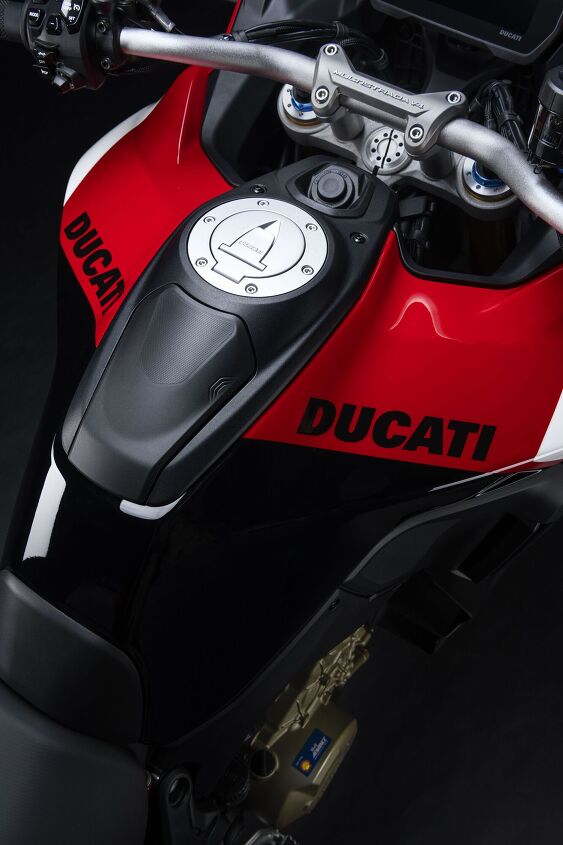 Still, you could definitely feel the new PP’s sporting nature coming through. More committed ergos take the form of footpegs 10mm higher and rearward compared to the other Multis, with an 18mm narrower handlebar set lower and more forward. Even so, the riding position still felt pretty neutral to me, just about right in fact for my 5’8” bod. It was easy enough for me to touch the ball of one foot on the ground with the stock seat, but when our Ducati guy asked if I’d like to try the optional 20mm lower seat, why not? With it, I felt like I was sat down even more inside the bike – not a bad place to be given the threatening atmospheric conditions.
Still, you could definitely feel the new PP’s sporting nature coming through. More committed ergos take the form of footpegs 10mm higher and rearward compared to the other Multis, with an 18mm narrower handlebar set lower and more forward. Even so, the riding position still felt pretty neutral to me, just about right in fact for my 5’8” bod. It was easy enough for me to touch the ball of one foot on the ground with the stock seat, but when our Ducati guy asked if I’d like to try the optional 20mm lower seat, why not? With it, I felt like I was sat down even more inside the bike – not a bad place to be given the threatening atmospheric conditions.
The low and high seat options, I think we determined, are Ducati Performance pieces, and as such are pre-wired for heat. Oh! Can we plug it in and have some then? No, the dealer has to do that with his computer. Ditto for the grip heaters: There’s a button on the right switchgear for them, but no heat is forthcoming at this time.
If the Duc had had a place for me to swipe my VISA card, I would’ve happily done so. (It does have a little cubby for your phone, with USB port, conveniently located right on top of the gas tank.)
Feels smaller
It’s not a tiny motorcycle at 527 pounds wet, but the light wheels and the backward-spinning crank make the Pikes Peak feel pretty quick in transitions. At the same time, we’ve increased trail from 4.0 to 4.7 inches compared to the other Multi V4s, and that single-sided swingarm is longer, bringing wheelbase from 61.7 to 62.8 inches. She’s nice and stable.
Even though it looks a little top-heavy, I have to agree with our ride leader Jake Zemke that it doesn’t feel that way; the PP is actually a few pounds lighter than the Kawasaki Z H2 I loved in our naked bike comparison.
Compared to the Streetfighter V4 S that won the street part of that same Heavyweight Nakeds comparison the other day, the Multistrada is almost soothing to ride. It’s about 60 pounds heavier than the Streetfighter, and its 1158 cc Granturismo V4 isn’t trying to send you into 14,000-rpm low orbit all the time. In fact, the big round digital tachometer says it’s game over at 10,500 rpm, right where Ducati says our max 170 horsepower resides (same as the base Multistrada and the S). You’re definitely riding a powerful motorcycle, but not a ridiculous one: The 1158 is torquey and tractable, in addition to revvable and lovable, and the PP gets a sweet Akrapovič muffler for just the right level of gruffness.
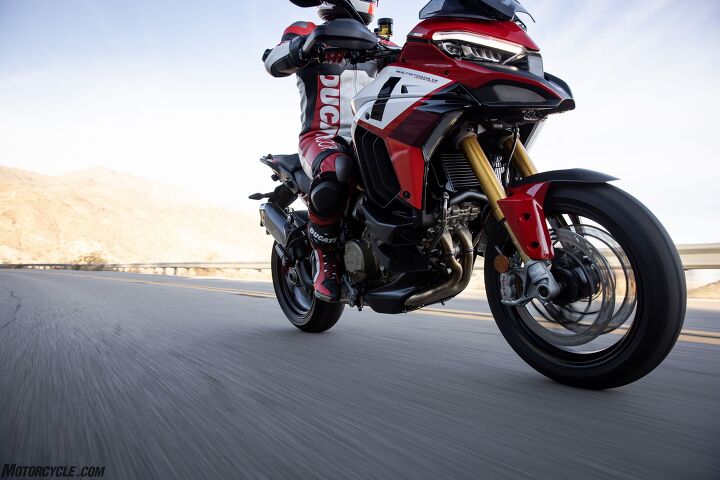
We’ve got plenty of brakes: 330mm discs and Brembo Stylema monobloc calipers are from the Multistrada V4 S, but with the more aggressive pads from the Panigale V4. Dialing up ABS level 1 deactivates rear ABS, pleasing Troy S. by “allowing the rear to drift under braking in sportier driving.”
The only thing I can criticize is that the Multi PP’s improved quickshifter doesn’t shift quite as smoothly, up or down, as the one on the Streetfighter V4.
Racey
Race mode should be good in the event you need to take your PP on track: “Undoubtedly the sportiest ever adopted by a Multistrada… the system exploits an even more direct throttle response in High Power Mode. Ducati Traction Control and Ducati Wheelie Control operations are reduced to a minimum and the ABS is set to level 2, also allowing controlled lifting of the rear wheel and therefore getting the most out of the braking phase, even on the racetrack. The Race Riding Mode is undoubtedly the ideal choice for experienced riders who wish to exploit all the exclusive performance the Multistrada V4 Pikes Peak can offer.”
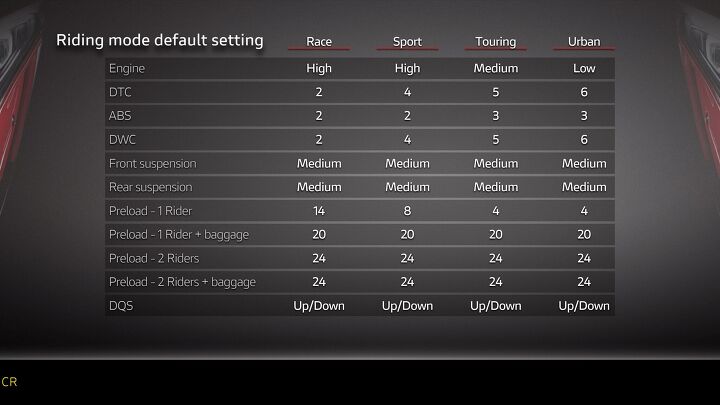
For the Pikes Peak Multi, Race mode replaces Enduro. Race and Sport modes are definitely more frenetic than Touring, which I settled on when the rain started to become Deluginal, but which also felt steamy enough when it was mostly dry. Other press materials say Touring gives us the full 170-hp, but with smoother, less sharp throttle response.
Öhlins Smart 2.0
The Pikes Peak departs from normal Multi V4 convention in its use of Öhlins latest Smart 2.0 suspension, which is what they refer to as an “event-based” system. It’s the same stuff used in the Panigale V4 S and Streetfighter V4 S. The other Multis’ Skyhook dampers are constantly measuring suspension stroke and speed, but the Smart 2.0 fork and shock also rely more on the bike’s IMU to know when you’re accelerating hard or braking hard or whatever, to also inform the damping. Ducati says it “automatically adjusts the setting according to the user’s riding style… the more the rider pushes to the limit the suspensions get stiffer.” The Smart system provides 6.7 inches wheel travel, front and rear; the Skyhook on the other Multis gives 6.7/7.1 in.
Naturally, you can delve deeper with the buttons/joystick on the left switchgear to fine-tune damping to your liking, along with a lot of other parameters. If some of Ducati’s early efforts were difficult to decipher for those of us who fear the computer, the latest version couldn’t make it much easier to swap modes and things, and the big 6.5-inch TFT is like grandma’s big-dial telephone.
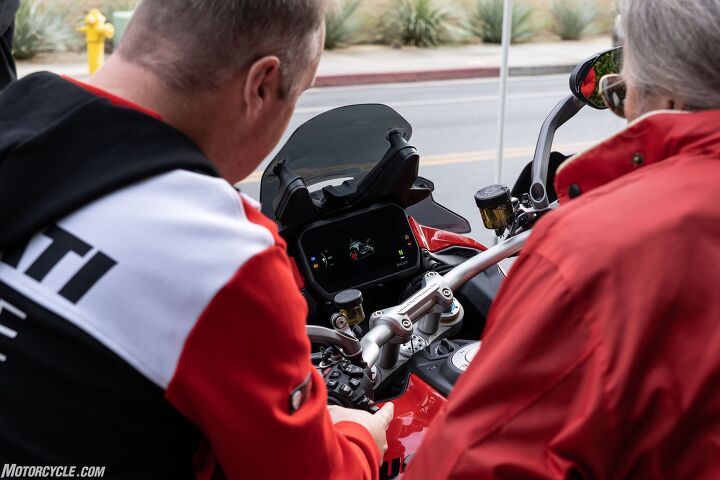
Your highly readable 6.5” TFT dashboard can be set to six different languages and different angles via a knob. The Ducati Connect system allows the phone’s “mirroring” function to quickly check the phone book, answer incoming calls and listen to music. The Sygic GPS navigation app is supposed to project your map onto the screen, along with all the information to help you through your chosen route…
Rain mode: Activate
How ironic there is no Rain mode on this one. Urban’s the same thing I guess. I felt secure enough in Touring mode when the rain began to fall in earnest on our way up the mountain, watching the temperature indicator lose degrees by the mile. Down into the 40s, I was feeling surprisingly toasty inside my nice warm gear as my IMU processed its large Italian lunch.
With Jake Zemke leading the pack and myself 5 or 6 bikes back, all I had to do was follow the taillights as the rain grew heavier. Say, maybe this vintage Ducati rain jacket I pulled from the closet is more of a windbreaker? Either way, it seemed to be channeling water into my crotch, as my undercarriage began feeling a bit soggy.
Also, my fingers were starting to feel damp inside my Alpinestars Drystar gloves. Not cold yet, thanks to the bike’s handguards, but definitely damp. About that time, I don’t think I was breathing any harder, but my face shield was starting to fog a bit. Brake lights were still easy to see, but later a couple of guys told me they’d switched on their adaptive cruise control to maintain their distance to the bike ahead without having to use the throttle or brakes. Apparently it works in curves, too, if you’re close enough. Why not? Surely Jake Zemke knows the correct speed…
I really didn’t want to open my Shoei’s face shield, as it was raining pretty damn hard and the temp gauge was reading 35 F, but I finally had to when I lost the pack and couldn’t see which way the curves were going anymore. Ahhh, much better. I still had my glasses to keep stinging raindrops out of my orbs, and the Multi’s nice adjustable windshield was doing a commendable job throwing most of the atmospheric river over my helmet even at 30 or 40 mph. I caught back up to Zemke and the lads, and right after that we got to Idyllwild and stopped in the rain.
I think we’d decided to go up the mountain, and by we I don’t include me, because the weather report said the rain wasn’t going to turn to snow until 4 pm. Since it was already 2, and since stopping for coffee or a hot yoga session would’ve made it psychologically impossible to climb back onto the bikes afterward, we all laughed in the face of danger, hopped back on our watercraft, and set off over Highway 243 to get back down off the mountain ASAP.
We still had to go up quite a bit before going down, because the temp gauge was soon reading 32 and it stayed there for probably half an hour before it read 33, for which I was elated since at least it was going in the right direction. Then it went back to 32 for a while. For a long time there, the wake of the back tire ahead of me looked like it was on the verge of transitioning from liquid to solid, like the tread pattern off the rear Pirelli was staying distinct longer than it should’ve.
I don’t know if I blame the Drystar boots or the Aerostich suit’s leg zippers, but at some point I was operating the foot controls through a layer of liquid, and by then my gloves were also soaked completely through. Strangely enough, I really didn’t feel as cold as I felt like I should’ve given the wetness, the low 30s temps, and the fact I was riding a motorcycle. Even wet, the insulation in those gloves and boots keeps your body heat in, I suppose, and the Patagonia capilene long johns I bought circa 1996 are what saved me, under several other layers of cotton and fleece. I also can’t discount the Multi’s large frontal area and great windshield. (Two other riders were wearing newer Aerostich R3s, and they both stayed dry, Andy.)
Alas, getting over the top of the mountain exposed us even more to the brunt of the storm’s assault on the north side descent, and even as the air began creeping back up toward 40 degrees, some sudden wicked winds coming around passes literally nearly blew us off the road more than a couple of times – and keep your eyes peeled for all the rocks and dried vegetation chunks littering the road and blowing across it. No one has probably been happier to see Beaumont, California, appear through the clouds as we descended, than our little group. All in all, about as adventurous a ride as I’ve had without venturing off the pavement.
From Beaumont, it’s a quick blast west on I-10 back to Palm Springs, where it’s time to play with the adaptive cruise control again. It works great, just as advertised, even partially submerged in 18-wheeler wake, and I can totally see how it could become one of those things you didn’t know you needed but now can’t do without. There’s even an Overtake Assist function, which gives a little bit of acceleration when you activate the turn signal to pull out and pass the vehicle ahead of you.
The blind spot detectors are another thing you might as well have on a $29,000 motorcycle – little lights inset into the top of each mirror that light up when something’s coming up behind you.
The temp was 50 in Palm Springs when we got back, and only lightly raining; it was nice to be warm again. It’s all relative.
Pretty Dang Comfortable
The optional low seat treated me well throughout the day, but I think I like the ergos and thickness of the standard one a bit better. It’d be swell if this Ducati had the Pan America’s seat lowering feature at stops. If you wanted to, you could easily swap the higher handlebar off of the other Multi, I’m told, but for me the Pikes Peak’s lower, narrower one was fine. The windscreen goes up and down a couple inches easily with one hand, and like I said, was for me eerily quiet in either position. On the naked Streetfighter V4, I don’t think I would’ve made it back down off the mountain.
In Touring mode, the ride was still firm but never harsh – and with a few button taps you can soften it even more if you want. Given all that, and the big instrument panel you can hook your phone up to for navigation, I can’t think of any reason why this sportiest of Multi V4s couldn’t also be a great sport-tourer, especially given that the Multi V4S already is our best sport-tourer of 2021 in spite of the fact that it’s more an ADV bike.
For $28,995, why shouldn’t the Pikes Peak be excellent? That’s a bit on the pricey side, but then CEO Jason Chinnock tells us the average Ducati buy-in is in the $17-18k range, so the premium PP isn’t far out of line – and the no-valve-adjustments til 36,000 miles means the bike almost pays for itself. Don’t bother to be bent out of shape, because it sounds like they’re already sold out anyway.
Ducati and Pikes Peak had a sad ending with the death of Carlin Dunne two years ago and the decision to not race motorcycles up the mountain anymore, but Ducati decided to carry on with the premium Multi Pikes Peak anyway. Fitting, then, that we too all got a glance at the face of God on the new bike’s intro. We’ll be talking about this ride for a while: If it’s a sport-tourer for adverse conditions you’re after, this bike more than proved its worth.
And we learned some stuff. Guess who won the first PP Hillclimb in 1913? Floyd Clymer, illustrious publisher of Cycle magazine in the 1950s and ’60s. He never met a motorcycle he didn’t like.
|
In Gear
|
| 2022 Ducati Multistrada V4 Pikes Peak Specifications | |
|---|---|
| Engine Type | V4 Granturismo, V4 – 90°, 4 valves per cylinder, counter-rotating crankshaft, Twin Pulse firing order, liquid cooled |
| Displacement | 1,158 cc (71 cu in) |
| Bore x Stroke | 83 mm x 53.5 mm |
| Compression Ratio | 14.0:1 |
| Power | 170 hp (125 kW) @ 10,500 rpm (claimed) |
| Torque | 12.7 kgm (125 Nm, 92 lb ft) @ 8,750 rpm (claimed) |
| Fuel Injection | Electronic fuel injection system, Øeq 46 mm elliptical throttle bodies with Ride-by-Wire system |
| Exhaust | Stainless steel muffler, double catalytic converter and 4 lambda probes |
| Gearbox | 6 speed |
| Primary drive | Straight cut gears, ratio 1.8:1 |
| Ratio | 1=40/13, 2=36/16, 3=34/19, 4=31/21, 5=29/23, 6=27/25 |
| Final drive | Chain, front sprocket z16, rear sprocket z42 |
| Clutch | Multiplate wet clutch with hydraulic control, self-servo action on drive, slipper action on over-run |
| Frame | Aluminum monocoque frame |
| Front suspension | Öhlins Ø 48 mm fully adjustable usd fork with TiN treatment, electronic compression and rebound damping adjustment with Öhlins Smart EC 2.0 event-based mode |
| Front Wheel | Marchesini light alloy forged, 3.5″ x 17″ |
| Front Tire | Pirelli Diablo Rosso IV 120/70 ZR17 |
| Rear suspension | Öhlins TTX36 fully adjustable monoshock, electronic compression and rebound damping adjustment with Öhlins Smart EC 2.0 event-based mode, electronic preload adjustment, aluminium single-sided swingarm |
| Rear Wheel | Marchesini light alloy forged, 6″ x 17″ |
| Rear Tire | Pirelli Diablo Rosso IV 190/55 ZR17 |
| Wheel Travel (Front/Rear) | 170 mm / 170 mm (6.7 in / 6.7 in) |
| Front Brake | 2 x Ø 330 mm semi-floating discs, radially mounted Brembo Stylema monobloc 4-piston 2-pad calipers, radial master cylinder, Cornering ABS |
| Rear Brake | Ø 265 mm disc, Brembo 2-piston floating caliper, Cornering ABS |
| Instrumentation | 6.5″ TFT colour display with Ducati Connect and full-map navigation system |
| Dry Weight | 214 kg (472 lb) (claimed) |
| Kerb Weight | 239 kg (527 lb) (claimed) |
| Seat Height | Adjustable, 840 mm – 860 mm (33.1 in – 33.9 in) |
| Wheelbase | 1,595 mm (62.8 in) |
| Rake | 25,75° |
| Trail | 120 mm (4.7 in) |
| Fuel Tank Capacity | 22 l (5.8 US gal) |
| Number of Seats | 2 |
| Safety Equipment | Riding Modes, Power Modes, ABS Cornering, Ducati Traction Control, Ducati Wheelie Control, Daytime Running Light, Ducati Cornering Light, Ducati Brake Light, Vehicle Hold Control, Blind Spot Detection |
| Standard Equipment | Öhlins Smart EC 2.0 electronic suspension, Ducati Quick Shift, Adaptive Cruise Control, Hands-free, Backlit handlebar switches, 6.5″ TFT colour display with Ducati Connect and full-map navigation system, Full LED headlight, Carbon fiber front mudguard and beak, Type-approved Akrapovic muffler, Two-tone seat |
| Warranty | 24 months, unlimited mileage. |
| Valve Clearance Check | 15,000 km (9,000 miles) / 24 months |
| Valve Clearance Check (Desmoservice) | 60,000 km (36,000 miles) |


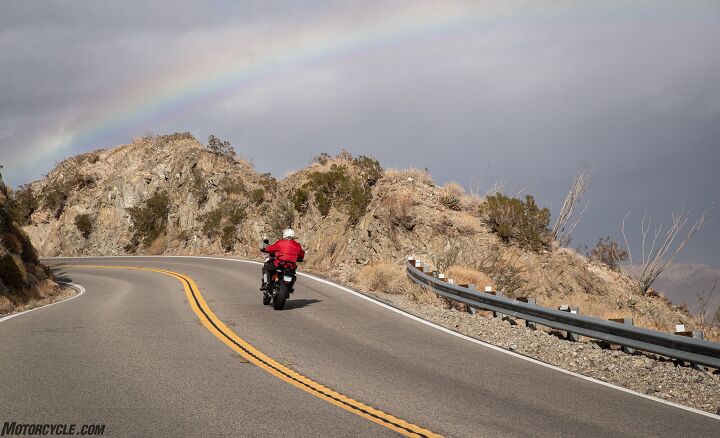
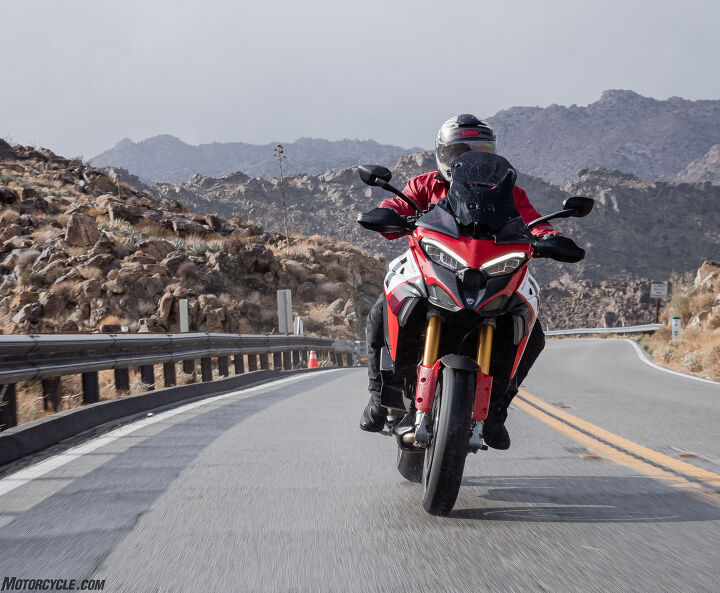
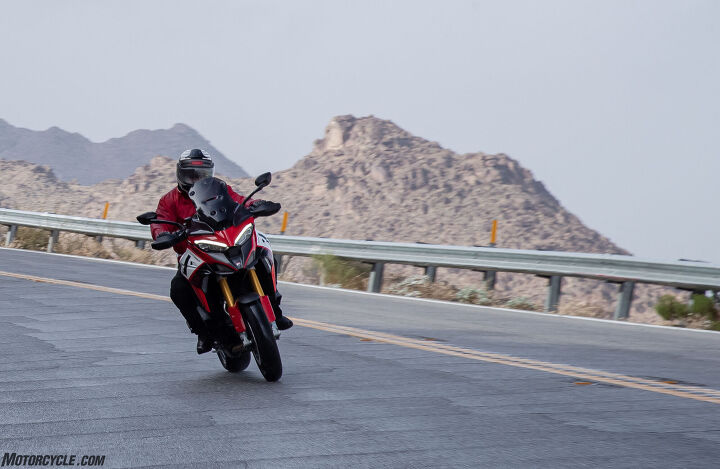
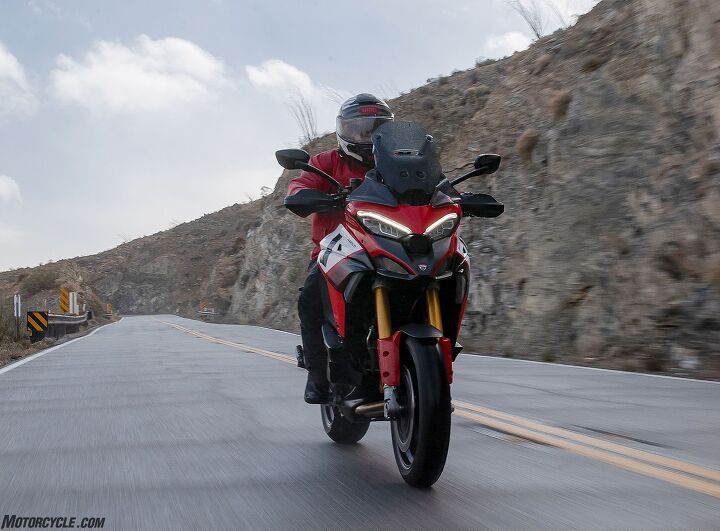

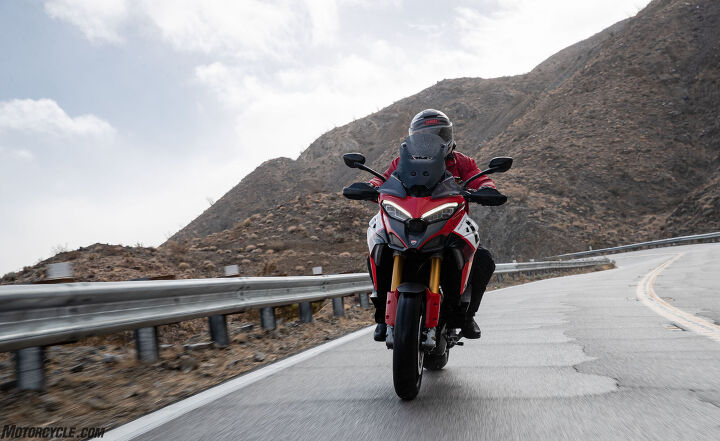
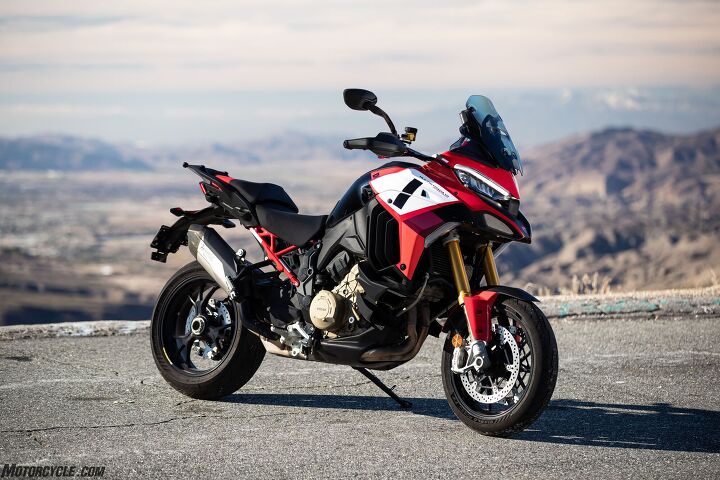
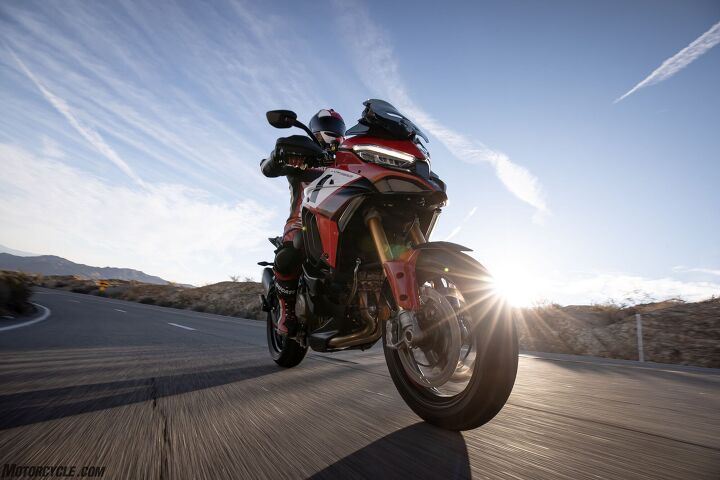
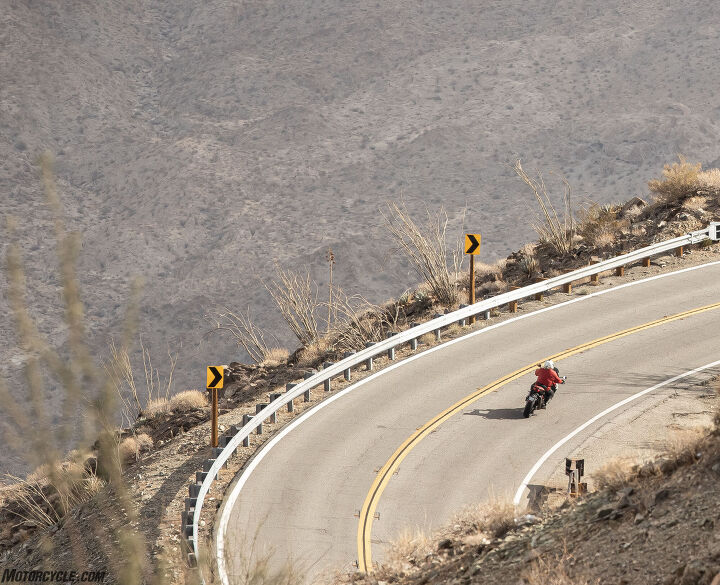
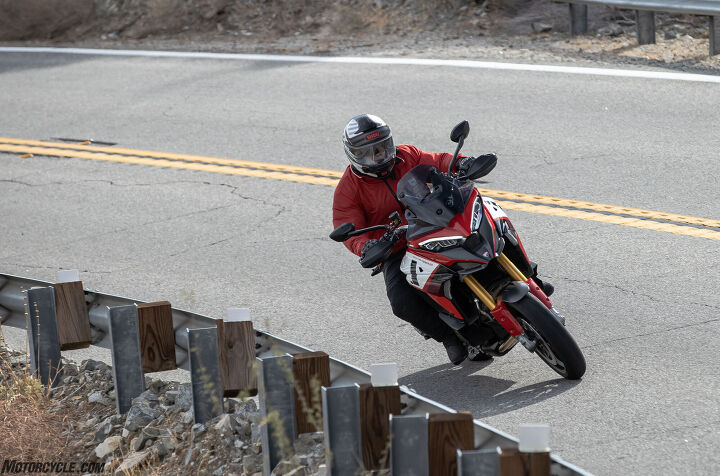
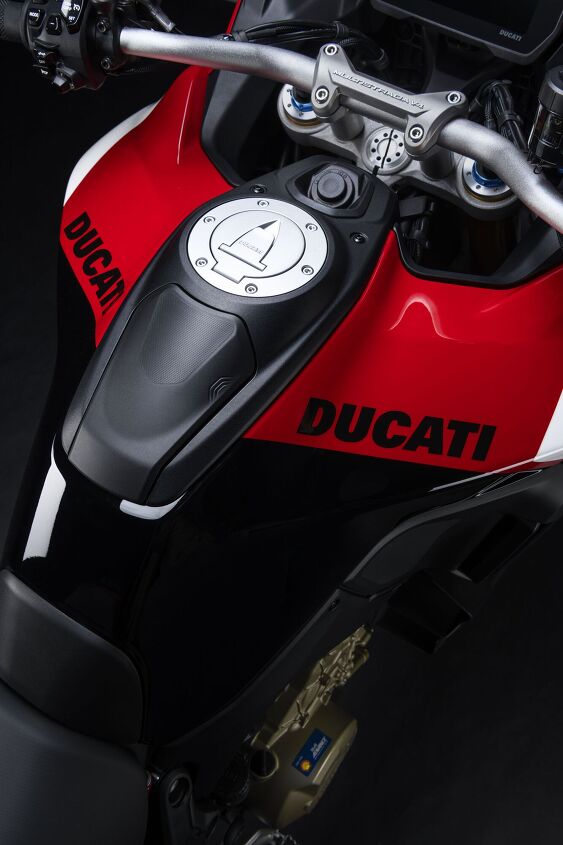

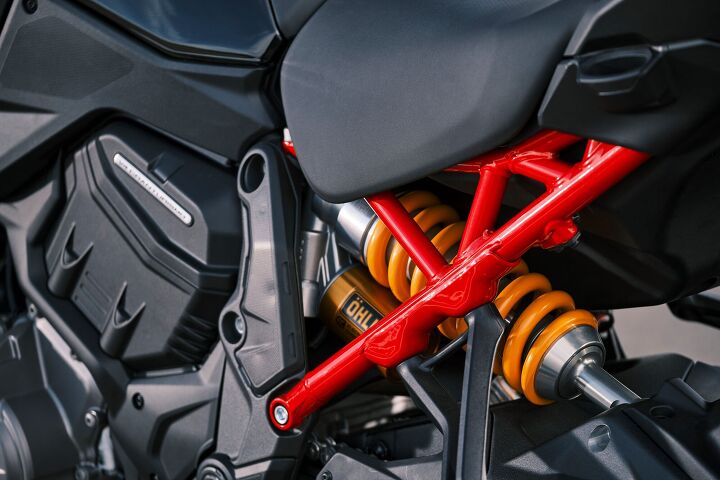
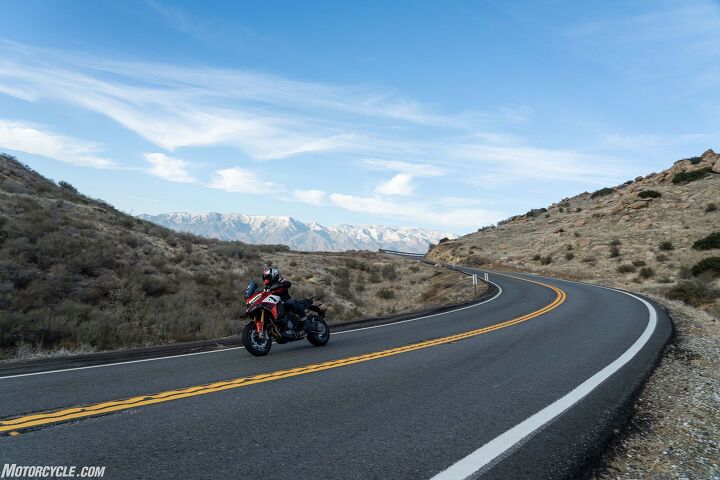
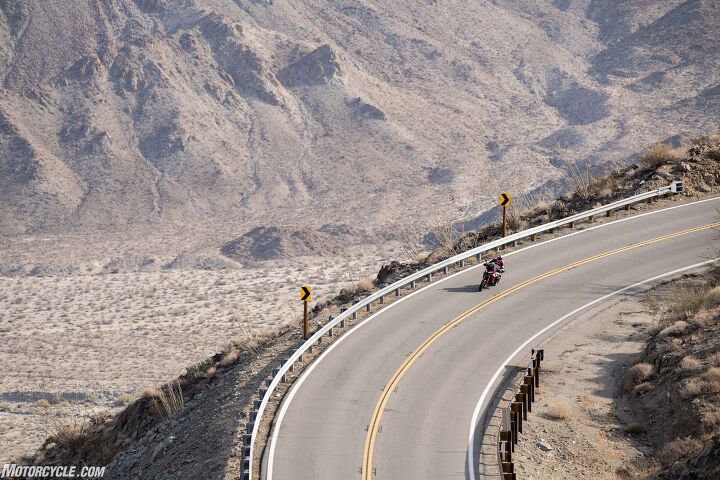

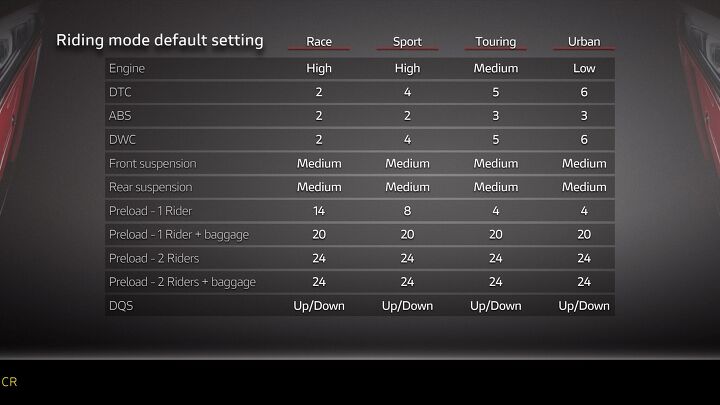



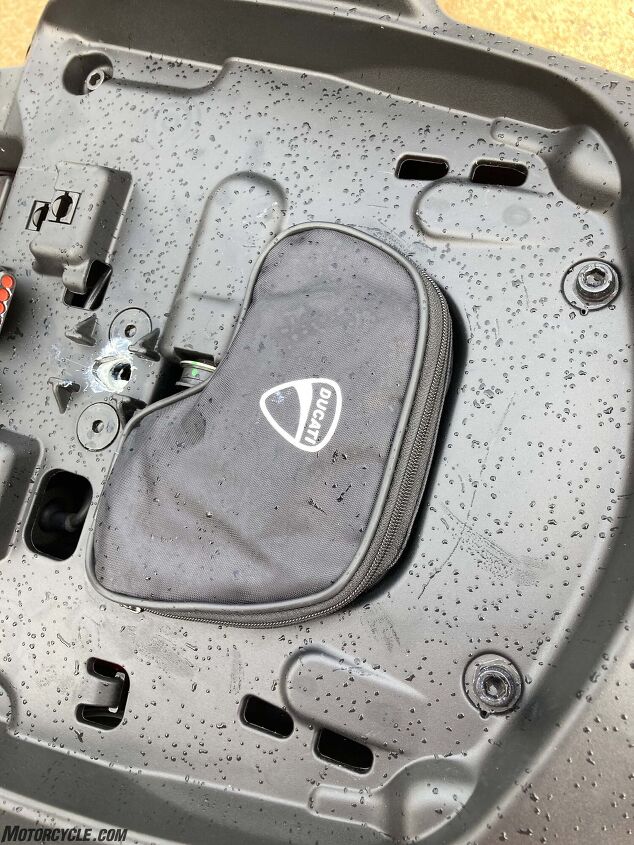

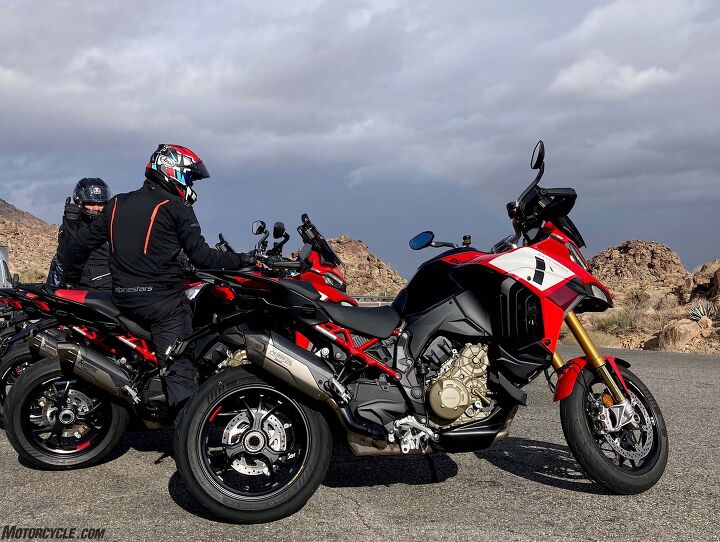

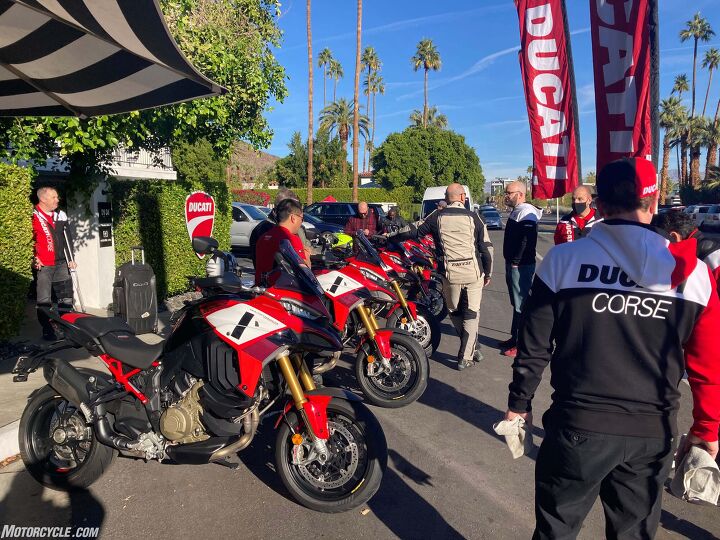




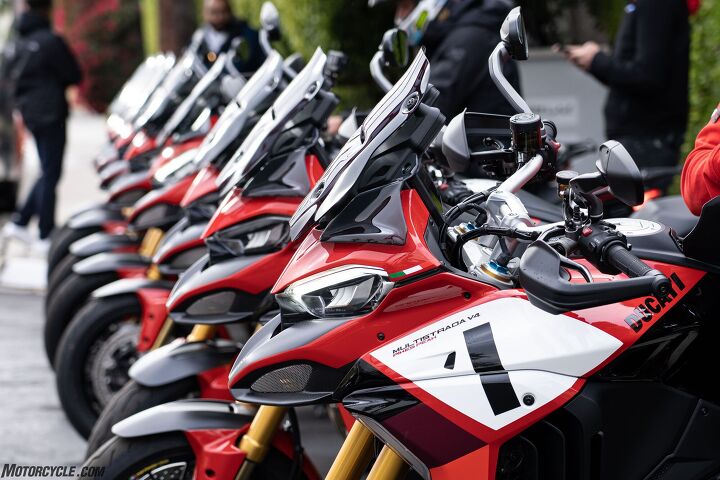
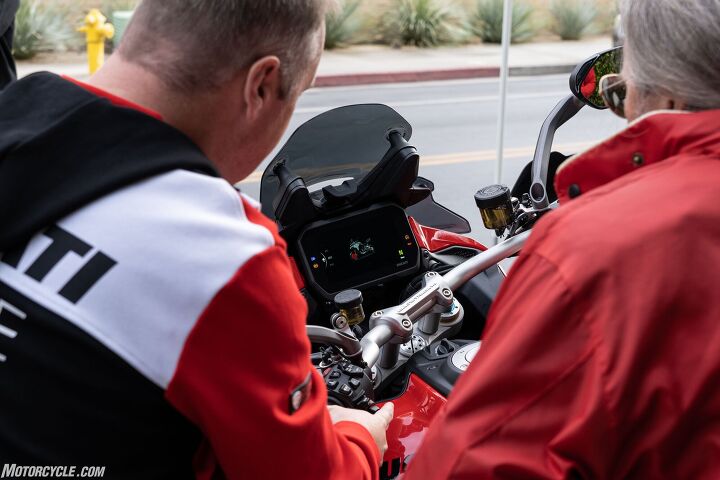
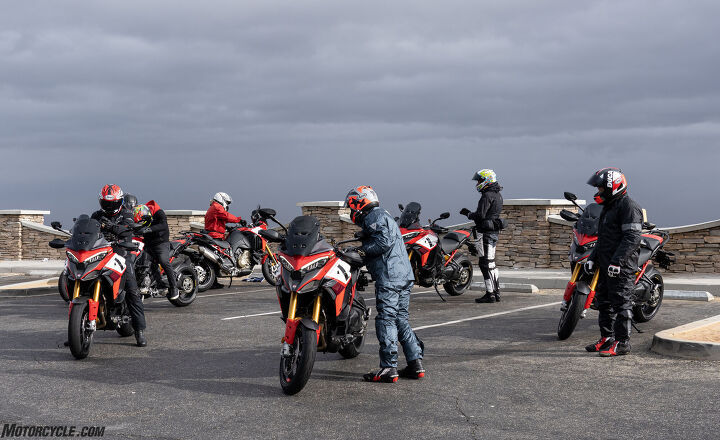


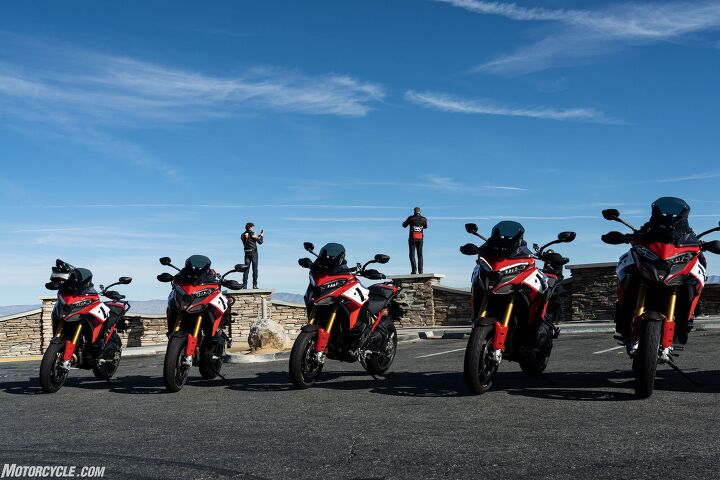
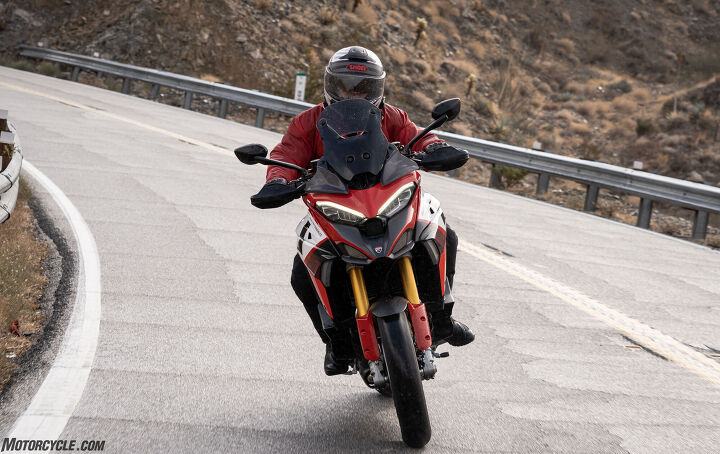
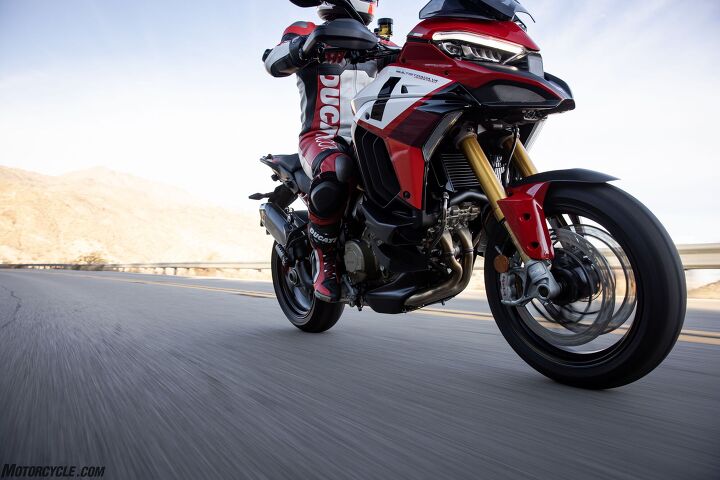
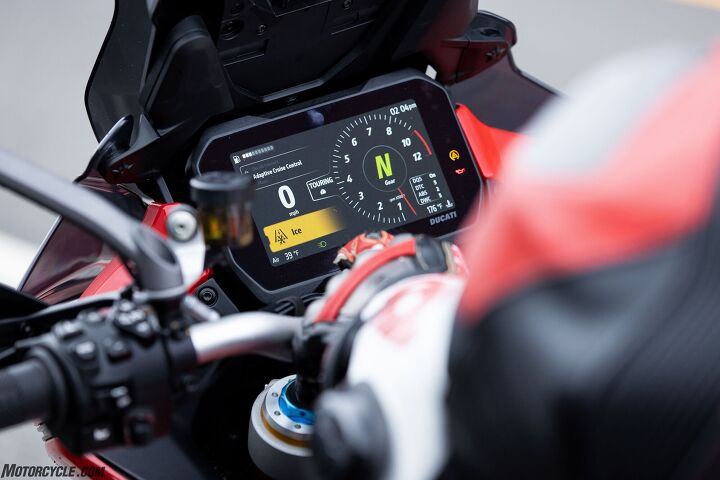

Become a Motorcycle.com insider. Get the latest motorcycle news first by subscribing to our newsletter here.
The post 2022 Ducati Multistrada V4 Pikes Peak Review – First Ride appeared first on Motorcycle.com.
Copyright
© Motorcycle.com


